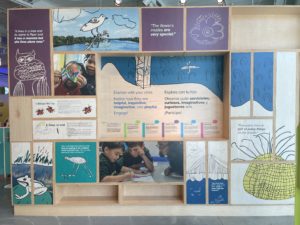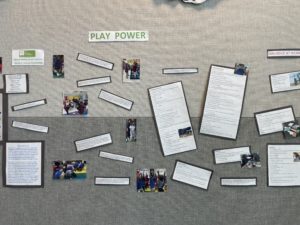The Power of Play
March 3, 2023
By Holly Dalferes, In Dialogue Director
and Shannon Blady PhD, Chief Learning Officer
“Play is often talked about as if it were a relief from serious learning. But for children, play is serious learning. Play is really the work of childhood.”
-Fred Rogers
When you think of play, what comes to mind? Did you picture imaginative play or dress up? Maybe you pictured building with blocks or solving a puzzle? Drawing? Running? Dancing? Play comes in many forms, and you can find them all at the Louisiana Children’s Museum. Your child might participate in many different kinds of play in one single visit! Here are a few that we see in the Museum and in our schools through our community outreach programs.
In independent play, children play by themselves: telling stories with a puppet, doll, or stuffed animals, doing puzzles, building with blocks, etc. Although we encourage interaction with your child in multiple ways throughout the Museum, we understand how sweet it is to sit back and enjoy their being lost in this little world that they have created for themselves. It is simply a time for you to observe this play milestone or to listen for new vocabulary or concepts that you can elaborate on or enhance later.
During social play, children play with one another or with adults: building with the Blue Blocks, creating friendly competitions, acting out make-believe stories, etc. This is when you and/or our play facilitators step in. When not directly instructing on a particular topic, our play facilitators will join in on the play by asking, “What are you playing?” “Can I play with you?” They are trained to ask open-ended questions to tap into the 100 Languages of Children and to learn about the child’s thinking and learning during play. They also might use this opportunity to highlight for you the In Dialogue threads throughout our Museum. These prompts are there to support you with ways in which you can be in dialogue with your child during your visits.

In guided play, children play within a context that adults have designed. For example, a camp counselor or a play facilitator might pose, “We’re going to put on a play using these props. What do you think the play should be about? How should we start it?” This also is what we see in the classrooms of the local schools in which we work, where teachers have set a playful situation through which he or she will teach a predetermined skill or concept.
The research on play is clear. It is VERY important for MANY reasons. Beyond the inherent enjoyment, play builds many of the skills that help children to navigate the world, including:
-negotiation with peers
-the use of trial and error to problem solve
-resilience in the face of difficulties; and
-reliance on creative thought when encountering unfamiliar situations or materials.
It also helps children to build confidence in their own competence and strengthens the bond between co-players, laying a foundation to be a better teammate, work collaborator, or partner. When children can interact with players of varying ages and skills (including other important adults), all involved have an opportunity to improve their skills by offering opportunities to be both model and observer.
And as Mr. Rogers so eloquently says, it allows for serious learning, but within a less-structured setting. This is because language blooms when formal reading and speaking “rules” are suspended, motor skills are enhanced when children can move freely, and more reserved children become bolder when they can explore without fear of being in the spotlight.
As you watch children play, also notice the STEM concepts that are being reinforced:
- Will a skinny Big Blue Block tower on each side support the long planks as we build our roof (engineering)?
- How can I make the water flow faster in Move With the River (physics)?
- How many crawfish do I need to feed all of my friends in Follow That Food (1:1 correspondence)?
- Can my whole family fit inside of the bubble in Make Your Mark (spatial awareness)?
Because of these tremendous learning benefits, play should continue even after the early years. We often forget this. When children enter “big school,” the em
phasis shifts to academic learning and the methodology depends more on textbooks and worksheets than exploration. We ignore the research when more structured school elements like formal curriculum and standardized testing enter the picture. With all that we know about play and its social, emotional, physical, and cognitive benefits, this simply should not be the case.
Consider this blog post as your reminder from us and from the beloved Mr. Rogers…Play is serious learning.
Come play with us!
———————————————————————-

Our aptly named outreach program Play Power, generously supported by W.K. Kellogg Foundation, is currently in three local charter schools, serving almost 600 students and over 40 teachers in grades K-2. Play Power is an embedded program designed to empower children to grow, develop, and heal through play. In our weekly sessions, we aspire to bring joy and fun to learning by supporting play-based social and emotional development through art activities, games, literature, and dramatic storytelling. We also offer opportunities for children to share and to listen to their peers during class discussions and table talk, something that can also disappear as students progress through school when content replaces conversation.
We are thrilled to see such positive progress in all of our classes. This format has been particularly successful for children who struggle with the traditional classroom curricular and behavioral expectations, as they feel more freedom of self-expression.
In addition, we are committed to providing professional development for faculty from all three campuses to interact with the goal of encouraging student-centered, play-based learning across our schools and to build a support system for teachers who would otherwise not have an opportunity to collaborate with each other.
For more information about Play Power, visit https://lcm.org/programs/outreach-programs/
———————————————————————-
Other resources on this topic:
https://www.naeyc.org/resources/pubs/tyc/aug2018/talking-parents-about-play-and-learning
